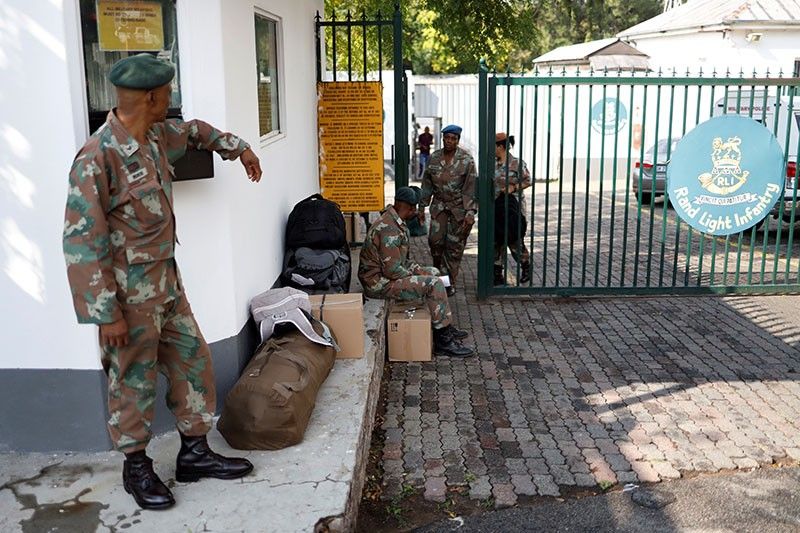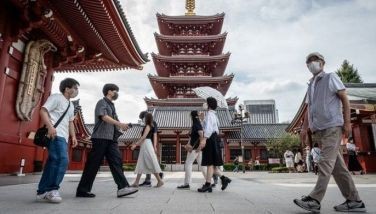South Africa orders lockdown as continent moves to stop virus spread

PRETORIA, South Africa — Numerous sub-Saharan countries acted to stem the spread of coronavirus on Monday, with South Africa announcing a soldier-patrolled lockdown and Senegal and Ivory Coast each declaring a state of emergency.
The pandemic had been slow to spread in Africa compared to the Middle East and Europe, but in recent days the number of deaths and infections have increased, sparking concerns about the continent's vulnerability to contagious diseases.
South Africa's President Cyril Ramaphosa said the government had "decided to enforce a nationwide lockdown for 21 days" from midnight Thursday to "avoid a human catastrophe".
There have been more than 400 coronavirus cases in Africa's most developed economy — the highest in sub-Saharan Africa — with the number multiplying six-fold in just eight days.
Ramaphosa said the numbers could spiral given that South Africa has "a large number of people with suppressed immunity because of high HIV and TB and high levels of poverty and malnutrition."
"This is a decisive measure to save millions of South Africans from infection," he said. "Without decisive action, the number of people infected will rapidly increase... to hundreds of thousands."
Ramaphosa said the army would patrol the streets along with the police to ensure the ban is respected.
'The situation is critical'
More African countries are expected to announce tough confinement measures after sealing their borders and closing public places.
Senegal declared a state of emergency as well as a dusk-to-dawn curfew starting on Tuesday.
"I say this to you with solemnity — the situation is critical. The speed of the progress of the disease requires us to raise the level of the response," Senegalese President Macky Sall said late Monday, calling the pandemic a "true world war".
Fellow West African nation Ivory Coast ordered a similar curfew, as well as progressive confinements measures based on the geographic spread of the virus.
In the centre of the continent, DR Congo locked down its second city Lubumbashi for 48 hours on Monday and deployed security forces. Streets were deserted and stores were closed, an AFP journalist said.
The move came after two people with coronavirus arrived on Sunday on a flight from the capital Kinshasa.
The DRC has recorded 30 cases of coronavirus since March 10, two of them fatalities.
Rising cases
Africa hasn't yet suffered the kind of terrifying rise in virus cases seen elsewhere.
The reason for this is unclear, but many African countries have used the precious time to impose travel restrictions, close schools and appeal for social distancing.
However, those numbers are now rising significantly.
According to a toll compiled by AFP, the number of known cases across the continent — including North Africa — stood at more than 1,600 on Monday, of which some 50 have been fatal.
The first detected case south of the Sahara was announced in the Nigerian city of Lagos on February 28, and the first death was reported in the Sahel state of Burkina Faso last Wednesday.
That was followed by fatalities in Gabon, the DRC and Mauritius.
On Monday, three more countries were added to this list: Nigeria — the most populous country in Africa — as well as The Gambia in western Africa, and Zimbabwe in the south.
All three deaths were of individuals who had arrived after making extensive trips abroad.
Peril for Africa
Ghana on Monday closed schools and universities and suspended public events, while in Burkina Faso a security source said the authorities "were thinking more and more about total confinement of the population for two or three weeks".
Rwanda late Saturday barred all "non-essential" movement, Gabon imposed a night curfew, while the Indian Ocean island of Mauritius began a 14-day lockdown on Friday.
Health experts have sounded loud and repeated warnings about Africa's vulnerability to coronavirus.
Crowded shantytowns, poor sanitation and decrepit health infrastructure offer ideal opportunities for the lethal microbe.
"The system itself is overstretched and inadequate to deal with a coronavirus epidemic," Zimbabwean doctor Norman Matara told AFP last week.
But lockdowns too can have a catastrophic effect in countries where there is little or no social safety net to help people buy food or pay their bills.
"In reality, partial or total confinement could have disastrous effects for the African continent," Cameroonian writer Calixthe Beyala said on her Facebook page.
Follow this page for updates on a mysterious pneumonia outbreak that has struck dozens of people in China.
New Zealand Prime Minister Chris Hipkins says on Sunday that he had contracted COVID-19, testing positive at a key point in his flailing campaign for re-election.
Hipkins saYS on his official social media feed that he would need to isolate for up to five days -- less than two weeks before his country's general election.
The leader of the centre-left Labour Party said he started to experience cold symptoms on Saturday and had cancelled most of his weekend engagements. — AFP
The World Health Organization and US health authorities say Friday they are closely monitoring a new variant of COVID-19, although the potential impact of BA.2.86 is currently unknown.
The WHO classified the new variant as one under surveillance "due to the large number (more than 30) of spike gene mutations it carries", it wrote in a bulletin about the pandemic late Thursday.
So far, the variant has only been detected in Israel, Denmark and the United States. — AFP
The World Health Organization says on Friday that the number of new COVID-19 cases reported worldwide rose by 80% in the last month, days after designating a new "variant of interest".
The WHO declared in May that Covid is no longer a global health emergency, but has warned that the virus will continue to circulate and mutate, causing occasional spikes in infections, hospitalisations and deaths.
In its weekly update, the UN agency said that nations reported nearly 1.5 million new cases from July 10 to August 6, an 80% increase compared to the previous 28 days. — AFP
The head of US intelligence says that there was no evidence that the COVID-19 virus was created in the Chinese government's Wuhan research lab.
In a declassified report, the Office of the Director of National Intelligence (ODNI) says they had no information backing recent claims that three scientists at the lab were some of the very first infected with COVID-19 and may have created the virus themselves.
Drawing on intelligence collected by various member agencies of the US intelligence community (IC), the ODNI report says some scientists at the Wuhan lab had done genetic engineering of coronaviruses similar to COVID-19. — AFP
Boris Johnson deliberately misled MPs over Covid lockdown-breaking parties in Downing Street when he was prime minister, a UK parliament committee ruled on Thursday.
The cross-party Privileges Committee said Johnson, 58, would have been suspended as an MP for 90 days for "repeated contempts (of parliament) and for seeking to undermine the parliamentary process".
But he avoided any formal sanction by his peers in the House of Commons by resigning as an MP last week.
In his resignation statement last Friday, Johnson pre-empted publication of the committee's conclusions, claiming a political stitch-up, even though the body has a majority from his own party.
He was unrepentant again on Thursday, accusing the committee of being "anti-democratic... to bring about what is intended to be the final knife-thrust in a protracted political assassination".
Calling it "beneath contempt", he said it was "for the people of this to decide who sits in parliament, not Harriet Harman", the veteran opposition Labour MP who chaired the seven-person committee. — AFP
- Latest
- Trending

































